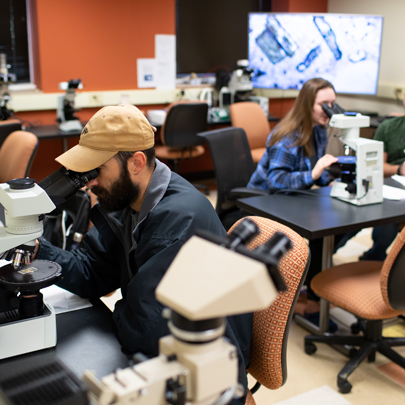Geology Concentration
Geology encompasses the broad study of materials of the earth and processes that affect them as well as the evolution of life and its impact on earth materials and processes. Earth processes include volcanism, plate tectonics, earthquakes, landslides, and ground and surface water migration. Geologists utilize their knowledge to identify and assess environmental hazards such as ground and surface water contamination, land surface stability, and volcanic and earthquake activity. Knowledge of earth processes also helps the geologist understand the formation, occurrence, and extraction of natural resources such as water, oil and gas, and valuable minerals and metals.
Geology is a great field of study for students who enjoy blending the outdoor physical environment with science. With consultation of a faculty advisor, our program prepares students for jobs in the geological sciences in private industry, state and federal government, and teaching, or for entrance into graduate school in the Earth and Environmental Sciences. Our graduates are successfully employed in the environmental field and in the exploration or production of natural resources. The Bachelor of Earth and Environmental Sciences with a concentration in geology prepares students for state licensure to practice geology in the state of Tennessee.

Set up an appointment to talk to an advisor.
Request Appointment
Advising Resources for Geology Students
Earth and Environmental Sciences majors are assigned a faculty advisor who can guide students on what courses they should be taking to achieve their career goals. Faculty advisors are listed on student’s One Stop Advising page. Students are required to meet with their advisor every fall and spring before they register for classes. The department encourages all students in the Geology Concentration to be familiar with the requirements for the concentration within the B.S. in Earth and Environmental Sciences degree. Below you can find links to degree checklists for the Geology Concentration, a schedule of when upper-division courses will be offered, and the General Education requirements (courses that need to be completed for all degrees at APSU).
Your advisor will give you the best advice for what specific courses you should be taking each semester. In general, the department suggests that students take any required lower-division (1000-2000 level) math, chemistry, and physics course as early as possible. Completion of these courses will greatly assist your success in upper-division courses (3000-4000 level courses). With regards to the order in which upper-division courses should be taken, it is recommended that majors take GEOG 3150/3151 Geographic Information Systems I and GEOL 3060/3061 Statistics as early as possible. Within the Geology Concentration, GEOL 3100/3101 Stratigraphy and Sedimentation and GEOL 3500/3501 Mineralogy are regarded as good, first upper-division courses to take. Whereas, GEOL 4080/4081 Structural Geology and GEOL 4250/4251 Hydrogeology, are courses better taken after a few upper-division courses have been completed.
Geology Concentration Curriculum
Upper-Division Course Schedule (2023-2027)
General Education Requirements
Geology Concentration Program Finder Page (Sample 4 Year Plan)